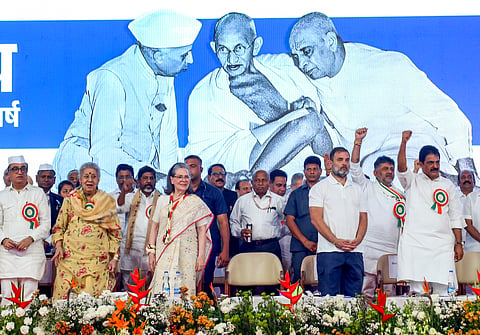

AHMEDABAD: At the Congress party’s national convention in Ahmedabad, a powerful chorus of leaders came together to call for unity, deep introspection, and a decisive pushback against what they described as divisive forces threatening the very soul of India.
Setting the tone on Day 2 of the meet, senior Congress leader Shashi Tharoor candidly acknowledged the party’s mixed trajectory—while it had doubled its strength in the Lok Sabha in 2024, its performance in state elections remained a concern. Emphasizing the urgency of the moment, he urged delegates to treat the AICC session not as a routine gathering, but as a pivotal turning point for the party’s future.
Tharoor linked this call for transformation with a broader ideological reaffirmation, reiterating the Congress’s vision of an inclusive India where one could be a proud Gujarati, a proud Muslim, and a proud Indian without contradiction. In doing so, he countered what he described as attempts to stoke regional discord, especially along a North-South faultline, and invoked Malayalam poet Vallathol to underline that regional pride must serve, not splinter, national purpose.
This theme of renewal was further woven into the party’s 140th anniversary narrative, with Tharoor positioning it as a moment of generational reckoning. He stressed that today’s youth—now the largest voting bloc—demand action over slogans, and insisted that Congress’s mission must center around inclusive economic growth that lifts up SCs, STs, OBCs, and the voiceless. Only by addressing these inequities, he argued, could the party hope to meet the moral test of history.
Echoing Tharoor’s sense of urgency, Telangana Chief Minister Revanth Reddy invoked the moral legacy of Gandhi and Sardar Patel, warning that Prime Minister Modi was walking in the “shadow of Godse” while claiming to follow Gandhi. He rallied the youth to resist what he described as a “Godse brigade” that was steering the country away from its founding ideals.
Picking up that momentum, Congress leader Kanhaiya Kumar delivered a fiery speech, framing the ideological fight not in weapons but in symbols—specifically, a T-shirt representing justice. He declared it the new uniform in a moral struggle against injustice and authoritarianism, pledging that every Congress delegate would return home as Gandhi’s foot soldier, ready to challenge oppression wherever it existed.
Kumar expanded this call beyond party lines, reminding attendees that the struggle was not merely for power but for principle—a continuation of the path once walked by Gandhi, Bhagat Singh, Annie Besant, and Ambedkar. That invocation of legacy found a powerful echo in Congress MP Imran Pratapgarhi’s defiant speech, in which he named Rahul Gandhi as the face of the current fight for justice. “In these dark times,” he said, “hatred has been weaponized—but Congress stands firm for love, for justice.”
Reaffirming his grassroots connection to the movement, Pratapgarhi declared himself a “common Congress soldier,” drawing a direct line from Gandhi’s freedom struggle to the contemporary battle against hate politics. He invoked the spirit of resistance, reminding the party that defeat is never final unless accepted—and that, just as India once threw off colonial rule, it could again uproot the politics of division.
Carrying the thread forward, AICC General Secretary Sachin Pilot addressed the growing violence and discrimination against women, Dalits, tribals, and backward communities. He invoked Sardar Patel’s 1948 Jaipur declaration, which pledged Congress’s unwavering commitment to secularism—a promise he said still stands. “Our message is clear,” Pilot declared, “drop hate, unite India.”
He reinforced this commitment by tracing Congress’s historical role in advancing women’s rights—from Annie Besant and Sarojini Naidu to Sonia Gandhi—and praised Rahul Gandhi’s activism during the Bhatta-Parsaul protests, which led to progressive land reforms. Drawing a sharp contrast with the present, he warned of growing wealth inequality, citing that 1% of Indians now control 40% of the nation’s wealth.
This economic critique segued into a broader indictment of the ruling party, as Pilot accused the Modi government of failing to deliver on critical promises like full statehood for Jammu and Kashmir. Instead, he said, democratic institutions were under assault, and the Constitution—whose very drafting, Ambedkar once said, would not have been possible without Congress—was being steadily eroded.
Pilot closed by framing the INDIA alliance, led by Rahul Gandhi and Congress president Mallikarjun Kharge, as a national coalition committed to reclaiming equality, dignity, and the Republic’s moral center. “The fight for India’s soul is far from over,” he said, “and history will remember where we stood.” In that moment, as Congress workers from across the nation listened intently, the message was clear: the battle was not just electoral, but existential—and it had only just begun.